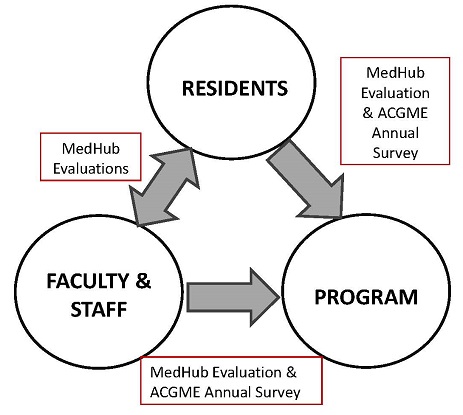| QUICK LINKS
— Other Resources American Board of Dermatology (ABD)
|
Goals & Objectives | Curriculum | Clinical Experiences | Research | Well-Being Accredited by the ACGME in 1955, the advanced program has 10 residents – PGY2-PGY4. A preliminary PGY1 year in a broad-based, accredited clinical specialty, such as internal medicine or transitional medicine, is required. Successful residents are eligible at the conclusion of their training for certification by the American Board of Dermatology. Applications are only accepted through ERAS and details are available on a separate page of this website. The training program is located in the Hyde Park neighborhood of south Chicago at the University of Chicago Medical Center. Goals & Objectives The faculty intends that all graduates of the University of Chicago Dermatology Residency Program will enjoy a long and fruitful practice, attain fulfillment and success in their personal career goals, and benefit humanity through the ethical practice of medicine. To that end, we expect that by graduation all of our trainees will have accomplished or achieved the acquisition of a knowledge and skill base that will support the following goals:
Curriculum The curriculum provides progressive opportunities in general dermatology, surgical dermatology (including Moh’s), pediatric dermatology and consults, adult consults, dermatopathology and electives in our UCM dermatology outpatient clinics. PGY3 residents also provide on-call service. As part of the surgical dermatology service, the surgical dermatology faculty (Drs. Bolotin, Onajin and Soltani) provide 1:1 feedback with residents in a 4-part practical skills review and feedback sessions. Residents on dermatopathology services, participate as intrinsic team members with the faculty and fellow by reviewing and participating in daily case sign out. Residents have an opportunity to practicing important teaching skills with medical students during their pediatric consult and dermatopathology rotations. Finally, residents are schedule for academic and administrative time.
PGY4 residents received 4 weeks of elective time during their senior year. This is typically scheduled in two 2-week blocks. The elective time should be spent dedicating oneself to a meaningful dermatology experience that enriches and rounds out one’s training, such as working with an expert at another institution, pursuing a research opportunity or working in a clinical practice environment being considered for one’s future career. Residents receive standard pay and benefits during the elective period because it is considered an official training activity. Any additional expenses, such as housing, transportation, and license or insurance fees, are the responsibility of the resident. Examples of recent electives:
This combination is the foundation for developing educational goals and objectives and the evaluation tools to measure the progress of training for dermatology Residents. Each milestone is measured in five levels of complexity from basic knowledge through advanced knowledge for the level of the resident’s training.
This is a comprehensive, 360° process that includes residents, faculty, clinical and administrative staff and program. On the resident level, the ACGME compentencies and milestones are the basis for determining progress in training. In addition to evaluations from faculty and staff, the residents also complete self evaluations. Residents are assigned faculty mentors at the beginning of training. The 360° process is completed by patient evaluations completed as part of their continuity clinics. All evaluations are reviewed semi-annually by the Clinical Competency Committee (CCC) in accordance with the requirements of the ACGME. Evaluations completed by the residents for faculty members are aggregated into an anonymous report which is reviewed by the Section Chief and Residency Director. Both residents and faculty participate in the program’s evaluation by completing the institutional GME and ACGME annual surveys. Information from these reports is used by the Program Evaluation Committee (PEC) to institute program improvements and complete the annual Annual Program Evaluation (APE) for the institution and the ACGME Accreditation Data System (ADS) report.
Clinical Experiences The primary training location is the Dermatology Outpatient Clinic at UCM Duchossois Center for Advanced Medicine (DCAM) – Hyde Park where we provide “excellent skin care from head to toe.” The clinical experience for our residents is enhanced with rotations to other UCM-associated clinic sites including:
A recent addition to our residents’ clinical experience is the opportunity to volunteer with UC Pritzker Medical Students at the Bridgeport Free Clinic whose mission is to make healthcare more accessible for underserved residents of the Bridgeport Community, with a focus on the Asian and Asian-American population. Scholarship by Residents Residents are strongly encouraged to contribute to medical knowledge through scholarly activity, presentations, and publications. This can take the form of original research, case reports, chapters, reviews, and oral and poster presentations at medical conferences. All residents are required to participate and present cases at the Chicago Dermatological Society annual meeting hosted by the University of Chicago. All PGY3 and PGY4 residents are strongly encouraged to submit abstracts for presentation at the American Academy of Dermatology annual meeting. All residents are strongly encouraged to present abstracts to the University of Chicago Department of Medicine Research Day and/or Department of Pediatrics Research Day. Residents are supported in their scholarly activities with an annual education fund which can be used to pay for related expenses such as conference registration and travel and additional study materials. Residents frequently participate in these meetings:
Publication Examples
Well-Being As part of the supervisory responsibilities of the Residency Director and faculty, monitoring the well-being of the residents is essential. Well-being is a multi-faceted concept that can include physical and mental health all with the purpose of maximizing the quality of the residents’ training experience. The foundation of the Dermatology Residency Program is to foster a safe environment for the residents so that they can discuss any issues directly. The Section of Dermatology supports the program’s efforts by sponsoring team building workshops such as the Hearing One Another provided by the UC Center for Identity & Inclusion. The program also depends upon the support of resources from the UCM GME Office, the UC Medical Center, and University of Chicago. |


